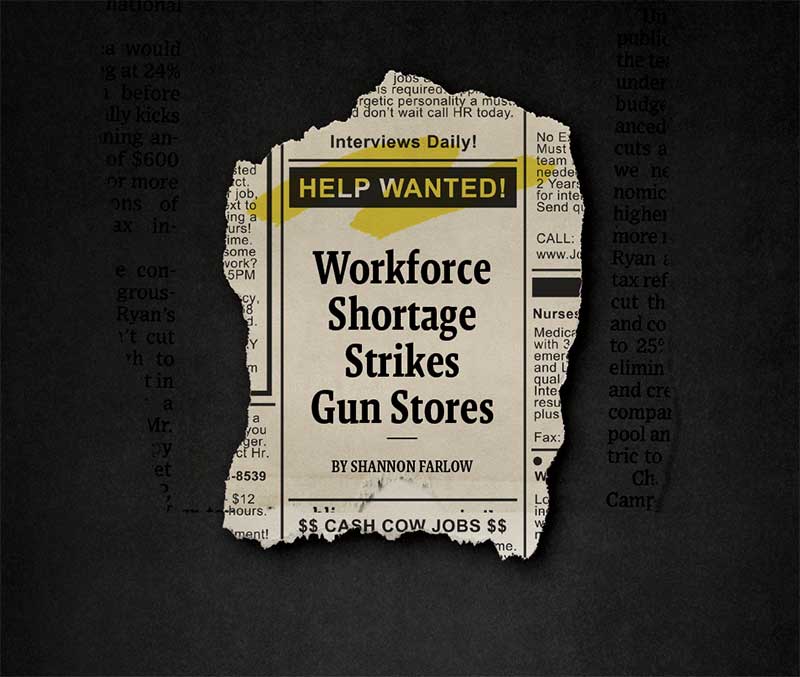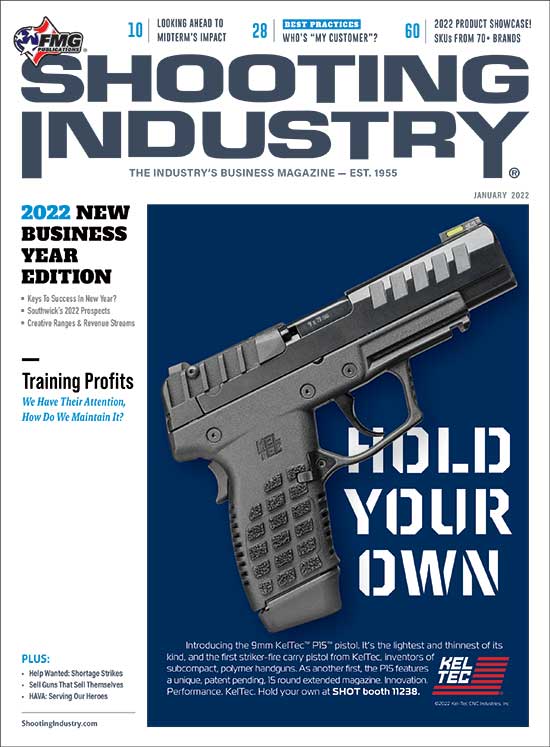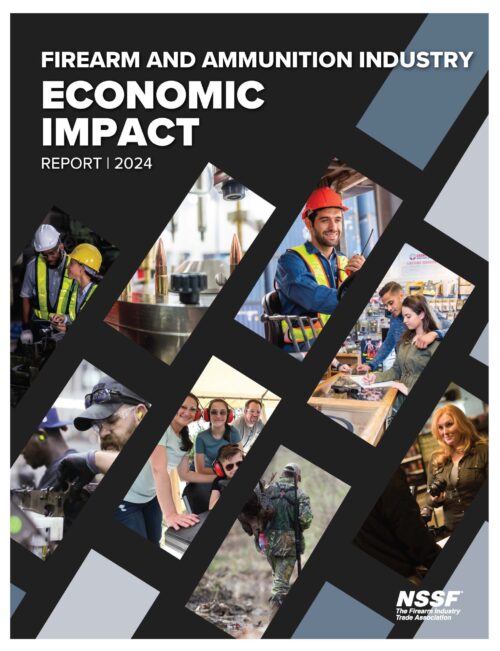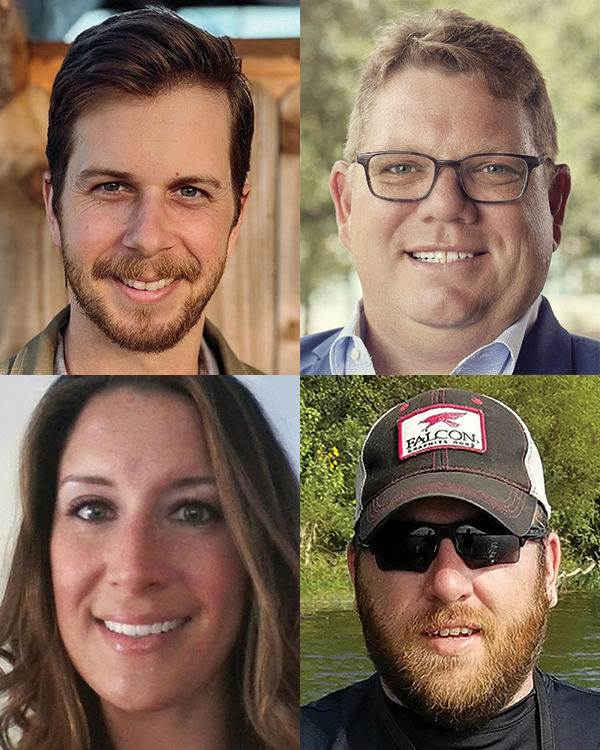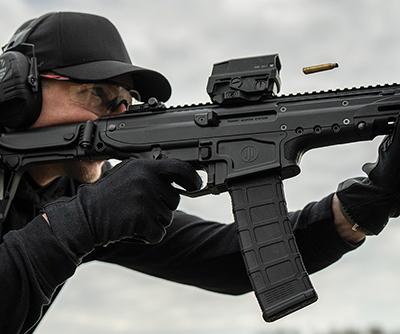Help Wanted
Workforce Shortage
Strikes Gun Stores
Aswe head into the first quarter of 2022, the future remains uncertain for many industries plagued by ongoing labor problems. Construction, food service, healthcare, hospitality, transportation and warehousing have been hit particularly hard by the historic workforce shortage. Businesses in those and other industries can’t find enough employees. Unfortunately, there’s no end in sight for the labor shortage.
How is the firearms industry — particularly gun stores and shooting ranges — faring in this current climate?
Historically, the shooting sports industry tends to stand apart. Economic factors that might cripple other industries, for various reasons, often have little impact on firearm and ammunition sales. In addition, many who choose to work in the shooting industry are enthusiasts with a passion for the products. For them, working at a gun store or range is a dream job. Are those factors alone enough to protect FFL dealers from labor problems? Are gun stores and shooting ranges experiencing the same difficulties hiring and retaining employees as other industries? If so, what are they doing to overcome the challenges?
To help answer these questions, we spoke with David Rich, owner and lead instructor at Naples Gun Shop & School in Naples, Fla.; Hillary Dube, owner of HNR Gunworks in Inverness, Fla.; and Jared Sloane, operations director at Shoot Smart in Fort Worth, Benbrook and Grand Prairie, Texas. They shared their experiences and strategies for hiring new employees, retaining staff members and more with Shooting Industry.
Are you currently operating with fewer employees? How is this affecting your day-to-day operations?
Dube: We’re having such a hard time hiring and need people for the snowbird season and for the holidays. We usually have at least three more employees, so averaging about 8–10. Today, we’re running with six. It has been crazy! We would typically hire only vets or L.E. professionals and used to be 50/50 male/female, but now we only have one male employee.
Rich: The main area I attempt to hire is for part-time Certified NRA Pistol Instructors. We have a great demand for the 101 classes that also qualify for the Florida Concealed Weapons & Firearms License, but we can’t come close to meeting the demand due to a lack of instructors.
Sloane: Yes. We’re at a 20-month low, but we’re hiring again. Our customer service and experience has been hit hardest. While we haven’t had to close stores or reduce hours, we’ve been very close. Managers have been pulling extra shifts and we’re utilizing more overtime and senior staff fill-ins than usual. For most of 2021, we struggled to both retain and recruit staff. Going into the pandemic, our average starting wage was $10–$11/hour. Between fears of the virus and the extra unemployment benefits, we struggled to get people to work. Most importantly, we struggled to find the ideal candidates to hire. More often than not, we’re hiring any applicant who meets very minimum standards.
What do you think is causing the staff shortage?
Sloane: I think we’re competing in a very discerning labor market. We have to compete with all retail businesses for any candidate, and I think many people are re-evaluating the work they’re willing to do. In my experience, gun-range work doesn’t appeal to everyone, the way working at The Gap or Target might, so the pool is smaller already. And many businesses are already paying higher starting wages, like local gas stations and fast food chains, so the pool shrinks some more. Throw in competitive health benefits, college tuition, stock options and cash signing bonuses, and we’re at a significant disadvantage. The pool is very small.
Dube: I wish I knew so I could fix it! We have had quite a few staff out with COVID-19 and we require a negative test to come back, so our regular staff has also been limited. I am lucky to have had a good crew before this all started. We’ve noticed a decrease in people applying for open positions and can only imagine people are afraid to come back to work and deal with such a large number of people in public.
”I think pay is still a key driver for talent.”
Jared Sloane, Shoot Smart
Is it harder today to find employees who have the necessary experience than in the past?
Rich: Yes. As an example, one of our pistol instructor applicants offered no evidence of any experience with handguns, yet wanted $70,000 a year for a part-time position. Almost all applicants we’ve screened are not qualified for consideration.
Dube: I’ve always had a hard time finding gunsmiths, but I have noticed even getting sales associates and NRA Instructors has been difficult lately.
Sloane: Not necessarily. I think pay is still a key driver for talent. When starting wages were $10/hour, a top-tier, skilled candidate might draw 20–50% more. That’s still the case, but now we’re starting at $12 or $13/hour, so the top talent needs to see $15–$18 or more to get their attention. We’re paying that now, and the number of talented or skilled candidates has significantly improved.
In years past, how did you typically advertise an open position?
Dube: It was all word of mouth or customers who ended up working here, but many people now are not looking for work, so we’re planning on changing how we operate and hire.
Sloane: Our best and most senior team members came in and asked to work for us. They’ve been with us for years. Other successes include Indeed posts and social media posts for “help wanted.”
Are you doing anything differently now to attract workers? Offering any additional incentives?
Rich: We had job postings on Facebook (which, as you know, hates anything to do with firearms, including safety classes) as well as other, more formal job recruitment websites. The Facebook ad brought us next to nothing, but then again, Facebook was throttling the actual exposure of our ad. The formal job sites brought us applications from unqualified candidates who wanted outrageous salaries. After five months, we’ve been able to bring aboard a few instructors and will soon be offering additional classes to meet the present demand.
Dube: At a recent staff meeting, we were talking about paying a service like Indeed to start hiring more experienced employees and possibly Facebook as well, just to expand the search.
Sloane: We’re basically advertising the same job, but with much higher pay. And it’s working.
”Training and keeping people is always a challenge as a gun-store owner.”
Hillary Dube, HNR Gunworks
Are you offering any additional incentives to retain current employees?
Dube: We haven’t yet, but we have thought about it. Have other businesses offered this and had it work? The gun industry is hard for this as training takes time and there is a high turnover rate in sales.
Sloane: In addition to pay increases, we’re refreshing our PTO policy to align better with how it’s accrued throughout the year, making it more friendly. And we’re going to launch health benefits later this year. We’re also commissioning some sales, like certain class registrations and membership enrollments, so staff members feel better recognized for those efforts.
What advice would you give to other gun-store owners and range operators who are having trouble hiring and retaining employees?
Dube: Training and keeping people is always a challenge as a gun-store owner. Taking the time to train the right way and retain people can be challenging, so I would say invest time in people and train them right and treat them right.
Sloane: None. I wouldn’t say anything we’re doing is special or unique. Like everyone else, we’re just trying to keep the doors open.
Dealers, have your say — is your operation facing challenges trying to hire new team members? How are you mitigating the impact of this happening? comments@shootingindustry.com

